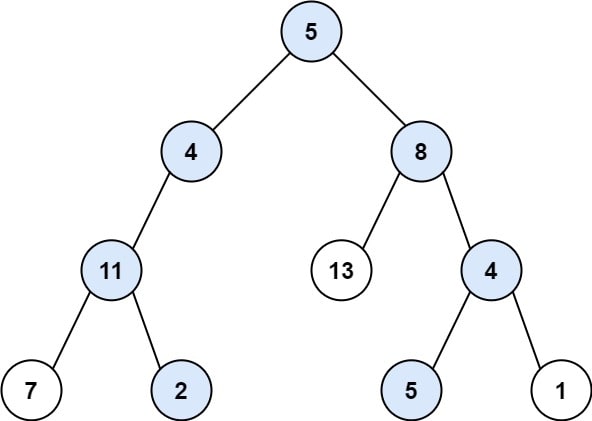Given the root of a binary tree and an integer targetSum, return all root-to-leaf paths where the sum of the node values in the path equals targetSum. Each path should be returned as a list of the node values, not node references.
A root-to-leaf path is a path starting from the root and ending at any leaf node. A leaf is a node with no children.
Example 1:
Input: root = [5,4,8,11,null,13,4,7,2,null,null,5,1], targetSum = 22
Output: [[5,4,11,2],[5,8,4,5]]
Explanation: There are two paths whose sum equals targetSum:
5 + 4 + 11 + 2 = 22
5 + 8 + 4 + 5 = 22
Example 2:
Input: root = [1,2,3], targetSum = 5
Output: []
Example 3:
Input: root = [1,2], targetSum = 0
Output: []
Constraints:
- The number of nodes in the tree is in the range
[0, 5000]. -
-1000 <= Node.val <= 1000 -
-1000 <= targetSum <= 1000
SOLUTION:
# Definition for a binary tree node.
# class TreeNode:
# def __init__(self, val=0, left=None, right=None):
# self.val = val
# self.left = left
# self.right = right
class Solution:
def pathSum(self, root: Optional[TreeNode], targetSum: int) -> List[List[int]]:
paths = [(root, [root.val] if root else 0)]
i = 0
op = []
while i < len(paths):
curr, val = paths[i]
if curr:
if not curr.left and not curr.right:
if sum(val) == targetSum:
op.append(val)
if curr.left:
paths.append((curr.left, val + [curr.left.val]))
if curr.right:
paths.append((curr.right, val + [curr.right.val]))
i += 1
return op




Top comments (0)